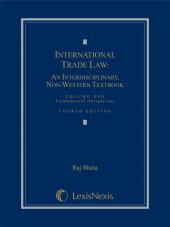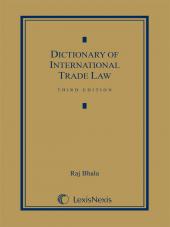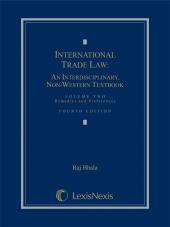International Trade Law: An Interdisciplinary, Non-Western Textbook, Volumes 1 and 2 Bundle
Select subscription type
Terms & conditions
Subscribers receive the product(s) listed on the Order Form and any Updates made available during the annual subscription period. Shipping and handling fees are not included in the annual price.
Subscribers are advised of the number of Updates that were made to the particular publication the prior year. The number of Updates may vary due to developments in the law and other publishing issues, but subscribers may use this as a rough estimate of future shipments. Subscribers may call Customer Support at 800-833-9844 for additional information.
Subscribers may cancel this subscription by: calling Customer Support at 800-833-9844; emailing customer.support@lexisnexis.com; or returning the invoice marked "CANCEL".
If subscribers cancel within 30 days after the product is ordered or received and return the product at their expense, then they will receive a full credit of the price for the annual subscription.
If subscribers cancel between 31 and 60 days after the invoice date and return the product at their expense, then they will receive a 5/6th credit of the price for the annual subscription. No credit will be given for cancellations more than 60 days after the invoice date. To receive any credit, subscriber must return all product(s) shipped during the year at their expense within the applicable cancellation period listed above.
Subscribers receive the product(s) listed on the Order Form and any Updates made available during the annual subscription period. Shipping and handling fees are not included in the annual price.
Subscribers are advised of the number of Updates that were made to the particular publication the prior year. The number of Updates may vary due to developments in the law and other publishing issues, but subscribers may use this as a rough estimate of future shipments. Subscribers may call Customer Support at 800-833-9844 for additional information.
Subscribers may cancel this subscription by: calling Customer Support at 800-833-9844; emailing customer.support@lexisnexis.com; or returning the invoice marked 'CANCEL'.
If subscribers cancel within 30 days after the product is ordered or received and return the product at their expense, then they will receive a full credit of the price for the annual subscription.
If subscribers cancel between 31 and 60 days after the invoice date and return the product at their expense, then they will receive a 5/6th credit of the price for the annual subscription. No credit will be given for cancellations more than 60 days after the invoice date. To receive any credit, subscriber must return all product(s) shipped during the year at their expense within the applicable cancellation period listed above.
Product description
International Trade Law: An Interdisciplinary, Non-Western Textbook has been revised in its latest edition, building upon the global successes of its predecessor editions. Truly a “world law” textbook applicable in any country, this edition offers a theoretical and practical approach to economics, politics, international relations, philosophy, and religion as they relate to international trade law. It may be used either in a two semester sequenced course, or as stand-alone volumes for distinct one-semester courses. Additional highlights of the 4th edition include:
• Coverage of vital domestic trade legislation on trade sanctions and export controls
• Emphasis on rising powers such as India and China, and controversies involving Iran, North Korea, and Russia
• Technical every-day issues, such as dumping margin and net countervailable subsidization rates, and critical economic sectors, such as IP and services
• GATT-WTO law and free trade agreements (FTAs)
The 4th edition has been thoroughly updated with new chapters covering: ethics, trade adjustment assistance (TAA), American trade history, Indian trade law and policy, WTO accession, like products, trade and energy, technical barriers to trade, transparency (TBT), non-application and waivers, balance of payments (BOP) crises, GATT morality exception trade facilitation, sanitary and phytosanitary (SOS) measures, compulsory IP licensing, trade remedies against non-market economies (NMEs), currency manipulation, trade sanctions, export controls, labor and the environment, trade and climate change, development economics, and Africa.
Each chapter is manageably sized and offers a user-friendly structure, allowing the flexibility of choosing the chapters that best serve the needs of a professor’s individual course. The topics in each chapter help students establish a fundamental foundation upon which to build their knowledge of international trade law.
Comprehensive Teacher’s Manual available. Includes sample course syllabi, questions, and answers.
Professors and adjunct professors may request complimentary examination copies of LexisNexis law school publications to consider for class adoption or recommendation. Please identify the book(s) you wish to receive, provide your institutional contact information, and submit your request here.
This book also is available in a heavily discounted, three-hole punched, alternative loose-leaf version printed on 8½ x 11 inch paper with wider margins and with the same pagination as the hardbound book.
epub is protected by Adobe DRM.
eBooks, CDs, downloadable content, and software purchases are noncancelable, nonrefundable and nonreturnable. Click here for more information about LexisNexis eBooks. The eBook versions of this title may feature links to Lexis+® for further legal research options. A valid subscription to Lexis+® is required to access this content.
Table of contents
VOLUME 1 FUNDAMENTAL OBLIGATIONS
Part 1 Moral Foundations of Free Trade
Ch 1 Philosophical and Religious Theories of International Trade and Traders
Ch 2 Theory and Practice of Ethics in International Law
Part 2 Economic Foundations of Free Trade
Ch 3 Free Trade History
Ch 4 Questioning Free Trade History
Ch 5 Trade Patterns and Factors of Production
Ch 6 TAA
Ch 7 Economics of Trade Barriers
Part 3 Historical Foundations of Free Trade
Ch 8 American Trade History
Ch 9 GATT Rounds Through 1970s
Ch 10 Uruguay Round (1986-1994) and Birth of WTO (1995)
Ch 11 DOHA Round (November 2001-Present)
Ch 12 Trade Policy in Modern India
Part 4 Institutional Foundations of Free Trade
Ch 13 Structure of WTO and GATT-WTO Law
Ch 14 GATT-WTO Accessions of Rich, Poor, Islamic, and Non-Islamic Countries
Part 5 Adjudicatory Foundations of Free Trade
Ch 15 GATT-WTO Civil Procedure
Ch 16 Procedural Controversies
Part 6 Product Relationships Essential to Legal Foundations of Free Trade
Ch 17 Like Products
Ch 18 Directly Competitive or Substitutable Products
Part 7 Legal Foundations of Free Trade: Five Pillars of GATT-WTO Law
Ch 19 First Pillar GATT Article I and MFN Treatment
Ch 20 First Pillar (Continued): Energy and 2014 LNG Exports Case
Ch 21 Second Pillar: GATT Article II and Tariff Bindings
Ch 22 Third Pillar: GATT Article III:1-2 and National Treatment for Fiscal Measures
Ch 23 Third Pillar (Continued): GATT Article III:4 and National Treatment for Non-Fiscal Measures
Ch 24 Fourth Pillar: GATT Article XI and QRs
Ch 25 Fourth Pillar (Continued): GATT Article XIII and Administering QRs
Ch 26 Fourth Pillar (Continued): TBTs as NTBs
Ch 27 Fifth Pillar: GATT Article X and Transparency
Part 8 Exceptions: Cracks in Pillars of GATT-WTO Law
Ch 28 GATT Article XXXV Non-Application, GATT Article XXV Waivers, and Trade Remedies
Ch 29 GATT Articles XII and XVIII and BOP Crises
Ch 30 GATT Article XX General Exceptions, But Not Human Rights
Ch 31 GATT Article XX(a) Morality Exception: Alcohol and Animals
Ch 32 GATT Article XX(a) Morality Exception (Continued): Censorship
Part 9 Customs Law
Ch 33 Country of Origin Marking
Ch 34 Entry of Merchandise
Ch 35 Tariff Schedules and Classification
Ch 36 Classification Conundrums
Ch 37 Tariff Valuation
Ch 38 PSI and Trade Facilitation
Ch 39 Border Security
Part 10 Trade and Agriculture
Ch 40 AG Market Access
Ch 41 AG Export Subsidies
Ch 42 Domestic AG Support
Ch 43 SPS Measures
Part 11 Trade and Services
Ch 44 Classifying Services and 4 Modes of Services Supply (GATS Parts I, V-VI)
Ch 45 General Obligations and Exceptions (GATS Part II)
Ch 46 Specific Commitments and Exceptions (GATS Parts III-IV)
Part 12 Trade and IP
Ch 47 Overview of IP
Ch 48 Substantive TRIPs Agreement Obligations
Ch 49 Compulsory Licensing, Evergreening, and Patented Pharmaceuticals
Ch 50 IP Enforcement
Index
VOLUME 2 REMEDIES AND PREFERENCES
Part 13 Remedies Against “Unfair” Trade: AD Law
Ch 51 Political Economy of Dumping and AD Duties
Ch 52 Procedures: Original Investigations Through Final Determinations
Ch 53 Procedures (Continued): After Final Determinations
Ch 54 Dumping Margin Calculation
Ch 55 Common Dumping Margin Calculation Issues
Ch 56 Adjustments to Normal Value
Ch 57 Adjustments to Export Price and Contructed Export Price
Ch 58 Injury
Part 14 Remedies Against “Unfair” Trade (Continued): CVD Law
Ch 59 Political Economy of Subsidies and CVDs
Ch 60 Definition of “Subsidy,” 1st Element: “Financial Contribution”
Ch 61 Definition of “Subsidy,” 2nd Element: “Benefit” Conferred
Ch 62 Definition of “Subsidy,” 3rd Element: Specificity Test
Ch 63 Traffic Light System and Red Light (Prohibited) Subsidies
Ch 64 Traffic Light System (Continued): Yellow Light (Actionable) Subsidies
Ch 65 CVDs Against Pre-Privatization Subsidies
Part 15 Remedies Against “Unfair” Trade (Continued): Causation in AD-CVD Cases
Ch 66 Philosophy and Economics of Causation
Ch 67 Determining Causation in Practice
Part 16 Remedies Against “Fair” Trade: Safeguards
Ch 68 Historical, Economic, and Political Rationales for Safeguards
Ch 69 Legal Criteria for General Safeguards
Part 17 Remedies Against NMEs
Ch 70 AD Cases Against NMEs
Ch 71 CVD Cases Against NMEs
Ch 72 Market Disruption
Part 18 Unilateral Trade Remedies
Ch 73 Rationales for Unilateral Retaliation
Ch 74 Section 301
Ch 75 Currency Manipulation
Part 19 National Security Protections
Ch 76 Morality of Trade Sanctions
Ch 77 American Trade Sanctions
Ch 78 American Export Controls: Nuclear Items
Ch 79 American Export Controls: Military Goods
Ch 80 American Export Controls: Dual Use Items
Part 20 Rationales for FTAs
Ch 81 Economic Aspects of FTAs
Ch 82 Political and Security Aspects of FTAs
Part 21 Common Legal Features of FTAs
Ch 83 GATT-WTO Disciplines on FTAs
Ch 84 Preferential ROOs
Part 22 Legal Commitments in FTAs
Ch 85 Typical FTA Market Access Obligations
Ch 86 Liberalizing Services Trade Through FTAs
Ch 87 Liberalizing and Protecting FDI Through FTAs
Ch 88 Additional Commitments in Deep FTAs
Part 23 Trade and Labor
Ch 89 International Labor Law and Trade Restrictions
Ch 90 Substantive Labor Obligations in FTAs
Ch 91 Resolving Labor Disputes Under FTAs
Part 24 Trade and Environment
Ch 92 GATT Article XX(b) and XX(g) Jurisprudence
Ch 93 Environmental Provisions in FTAs
Ch 94 Trade and Climate Change
Part 25 Preferences for Poor Countries
Ch 95 Development Economics: Measuring Growth, Development and Poverty
Ch 96 Development Economics (Continued): Economic Growth Models
Ch 97 Trade Policies, Growth, and Poverty
Ch 98 S&D Treatment
Ch 99 GSP
Ch 100 Special Help for Africa?
Index
 Lexis Nexis
Lexis Nexis 


